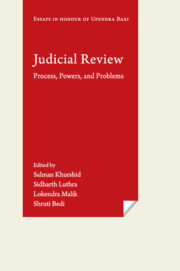Book contents
- Frontmatter
- Contents
- Foreword
- Editors' Note
- Introduction
- 1 The Inadequacy of Judicial Enforcement of Constitutional Rights Provisions to Rectify Economic Inequality, and the Inevitability of the Attempt
- 2 The Interplay of Law and Politics in India
- 3 Beating the Backlog: Reforms in Administration of Justice in India
- 4 Judicial Review: Perspectives and Reflections for the Twenty-First Century
- 5 When ‘Creeping Jurisdiction’ Goes Awry: The Social Action Litigation to Ban Surrogacy
- 6 Judicial Review and the Democratic Judge
- 7 Judicial Review: A Tool to Shape Constitutional Jurisprudence
- 8 The Baxian Bioscope on Indian Judicial Process
- 9 Judicial Activism, Courts, and Constitutional Revolutions: The Israeli Case
- 10 Democracy, Constitution, and Judicial Review: A Critique
- 11 A Minor Jurisprudence of Pathos: Upendra Baxi as Teacher and Writer
- 12 The Need for Reinventing the Supreme Court as a Constitutional Court
- 13 Appointment of ‘Distinguished Jurists’ as Judges in the Supreme Court of India: A Critical Analysis
- 14 Judicial Dissent and Judicial Review: A Functional Analysis
- 15 The Power of Judicial Review: Judicial Chutzpah or Judicial Desideratum
- 16 Judicial Review of Legislations by Tribunals in India: Law, Problems, and Perspectives
- 17 Criminalization of Membership of Terrorist Organizations in India and the United States of America: Human Rights Concerns
- 18 Article 142 of the Indian Constitution: On the Thin Line between Judicial Activism and Restraint
- 19 Sketching the Limits of Article 142 of the Constitution of India: A Constitutional Necessity
- 20 Constitutional Morality and Judges of the Supreme Court
- About the Contributors
- Index
17 - Criminalization of Membership of Terrorist Organizations in India and the United States of America: Human Rights Concerns
Published online by Cambridge University Press: 23 January 2020
- Frontmatter
- Contents
- Foreword
- Editors' Note
- Introduction
- 1 The Inadequacy of Judicial Enforcement of Constitutional Rights Provisions to Rectify Economic Inequality, and the Inevitability of the Attempt
- 2 The Interplay of Law and Politics in India
- 3 Beating the Backlog: Reforms in Administration of Justice in India
- 4 Judicial Review: Perspectives and Reflections for the Twenty-First Century
- 5 When ‘Creeping Jurisdiction’ Goes Awry: The Social Action Litigation to Ban Surrogacy
- 6 Judicial Review and the Democratic Judge
- 7 Judicial Review: A Tool to Shape Constitutional Jurisprudence
- 8 The Baxian Bioscope on Indian Judicial Process
- 9 Judicial Activism, Courts, and Constitutional Revolutions: The Israeli Case
- 10 Democracy, Constitution, and Judicial Review: A Critique
- 11 A Minor Jurisprudence of Pathos: Upendra Baxi as Teacher and Writer
- 12 The Need for Reinventing the Supreme Court as a Constitutional Court
- 13 Appointment of ‘Distinguished Jurists’ as Judges in the Supreme Court of India: A Critical Analysis
- 14 Judicial Dissent and Judicial Review: A Functional Analysis
- 15 The Power of Judicial Review: Judicial Chutzpah or Judicial Desideratum
- 16 Judicial Review of Legislations by Tribunals in India: Law, Problems, and Perspectives
- 17 Criminalization of Membership of Terrorist Organizations in India and the United States of America: Human Rights Concerns
- 18 Article 142 of the Indian Constitution: On the Thin Line between Judicial Activism and Restraint
- 19 Sketching the Limits of Article 142 of the Constitution of India: A Constitutional Necessity
- 20 Constitutional Morality and Judges of the Supreme Court
- About the Contributors
- Index
Summary
The Perspective
Freedom of association is one of the basic human rights. It is also a form of freedom of expression. Article 20 of the Universal Declaration of Human Rights acknowledges that ‘everyone has the right to freedom of peaceful assembly and association’. Similar provision may be found in the International Convention on Civil and Political Rights under article 22. The Constitution of India under article 19(1)(c) read with reasonable restrictions under article 19(4) expressly recognizes this right, while article 19(1)(a) read with 19(2) impliedly covers the fundamental right to become a member of an organization. Organizations can be lawful or unlawful. While membership of a lawful organization does not create problem, membership of an unlawful organization continues to remain a matter of political and legal debates. Both criminal organizations and anti-government organizations can be non-violent and violent in nature. While every criminal organization be it violent or non-violent is prohibited and punished across all jurisdictions, non-violent anti-government organizations are essential for democracies. Membership in such anti-government organizations should be protected under law. On the other hand, terrorist organizations are sui generis in nature because they are only violent organizations. In comparison to other organizations, terrorist organizations are ‘harder to deter’. Therefore, counter-terror legislations be it the Terrorist and Disruptive Activities (Prevention) Act (TADA), 1987, the Prevention of Terrorism Act (POTA), 2002, or the Unlawful Activities (Prevention) Act (UAPA), 1967, have consistently maintained the position that mere membership of a terrorist organization is punishable. Does fundamental right extend to obtaining membership of a terrorist organization or an unlawful organization engaged in seditious or secessionist activity? Can a law criminalize mere membership of a terrorist organization or an unlawful organization? Terrorist activity these days are ‘by no means a militants’ only strategy’. Several groups that have sprung up in the last century have had two wings: political and terrorist. One of the wings extends social services, runs businesses, and contests election which are lawful, non-violent activities, that is, it pretends to be a purely political or philanthropic. Three judgments of the Supreme Court, that is, State of Kerala v. Raneef, Arup Bhuyan v. State of Assam, and Indra Das v. State of Assam, have propounded that mere passive membership cannot be criminalized unless the member has intention to contribute in the illegal aims of the organization.
- Type
- Chapter
- Information
- Judicial Review , pp. 315 - 340Publisher: Cambridge University PressPrint publication year: 2020



